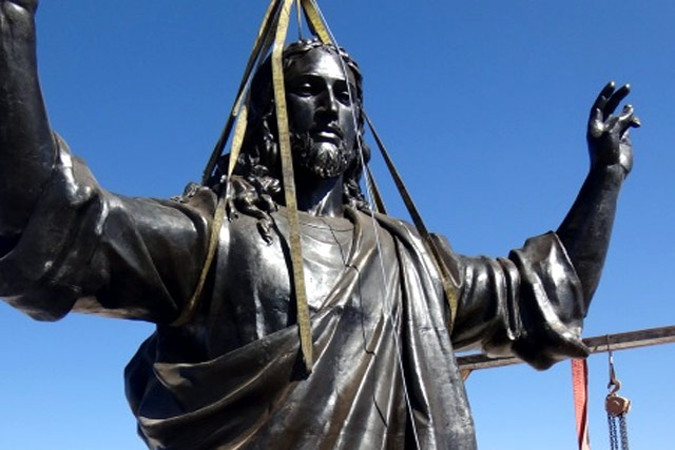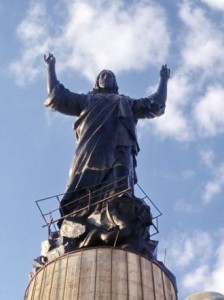
A bronze statue of Jesus Christ, taller than the famous Christ the Redeemer statue in Rio de Janeiro, has appeared in war-torn Syria. The statue, entitled “I Have Come to Save the World” was apparently the brainchild of Yury Gavrilov, a 49-year-old Muscovite who runs an organization in London called the St. Paul and St. George Foundation.
The project was backed by both the Russian Orthodox Church and the Russian government, which takes an active interest in Syria as seen in recent events. Russia also has a navy base on Syria’s Mediterranean sea coast.
Despite the statue’s Russian connection, it was cast in Armenia and made by an Armenian sculptor, Artush Papoian. Syria’s ethnic Armenians have been fleeing the country in droves since the conflict began, to the extent that Armenia has built a new settlement called New Aleppo to house them, the news website Eurasianet.org reported. The settlement is named after the war-torn northern Syrian city where most of Syria’s ethnic Armenian population live. Some 7,000 of Syria’s ethnic Armenians are now seeking refuge in neighboring Armenia, Armenian news agencies reported.
The Armenian statue was installed Oct. 14, which coincided with two religious holidays — both Orthodox Christian and Muslim. Orthodox Christians celebrate the feast day of the Protection of the Most Holy Virgin Mary and Muslims celebrate Kurban Bayram.
 Though all military activity was suspended in the region while the statue was being installed, the project has been in the works since 2005 and is not related to the current military crisis in the country, Komsomolskaya Pravda reported.
Though all military activity was suspended in the region while the statue was being installed, the project has been in the works since 2005 and is not related to the current military crisis in the country, Komsomolskaya Pravda reported.
The statue is located on a mountaintop near the city of Saidnaya.
The statue is near the Monastery of the Cherubim, perched above the historic pilgrimage route from Constantinople to Jerusalem and is 2,100 meters above sea level.
The statue stands at 39 meters tall together with the plinth, which is taller than Rio de Janeiro’s Christ the Redeemer statue, which stands at 38 meters. The enormous statue can be seen from neighboring countries Lebanon, Jordan, Palestine and Israel.
The director of Gavrilov’s St. Paul and St. George Foundation, Samir el-Gadban, commented on the importance of the statue in the war-torn country and expressed his hopes for the future.
”We hope that this sculptural composition brings peace and love to the hearts of people and that our work will help restore peace and calm in this long-suffering region,” he told Komsomolskaya Pravda.